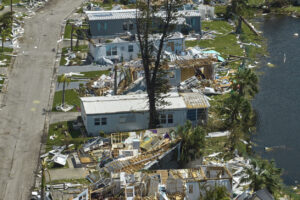Mutual Aid in Crisis: How Cities Can Share Resources During Natural Disasters
 by Chris Smith, LMCIT Risk Management Attorney
by Chris Smith, LMCIT Risk Management Attorney
When hurricanes or other disasters strike, the devastation can be overwhelming. From damaged infrastructure to displaced residents, local resources are often stretched thin. This is where the Emergency Management Assistance Compact (EMAC) comes into play, enabling states to assist one another during emergencies. The states of North Carolina and Florida have requested assistance from Minnesota and other states following hurricanes Helene and Milton.
What is the Emergency Management Assistance Compact?
The Emergency Management Assistance Compact is a mutual aid agreement among all 50 states, the District of Columbia, and several U.S. territories. Established in 1996, EMAC facilitates resource sharing between member states during emergencies such as the recent hurricanes. When disaster strikes and additional resources are needed, a state can request assistance from other states through EMAC. This might include personnel, equipment, or expertise to help in recovery efforts.
How EMAC Works After a Hurricane
Once a state’s governor declares a state of emergency, the affected state can formally request aid through EMAC. Other states then review the request and determine their available resources to fulfill the need. Through pre-established procedures, EMAC expedites the sharing of resources across state lines. This reduces response times and enables more effective support, which is crucial after a hurricane when time is of the essence.
Since EMAC is a state-to-state agreement, assistance by Minnesota cities is facilitated through Minnesota Homeland Security and Emergency Management (HSEM), a division of the Minnesota Department of Safety. HSEM will enter into a cooperative agreement with cities who are able to provide assistance and HSEM will coordinate the deployment of resources outside Minnesota.
EMAC Considerations Under Minnesota Law
EMAC is codified in Minnesota law in Minnesota Statutes, section 192.89, which states that employees of a state sending assistance “shall be considered agents of the requesting state for tort liability and immunity purposes.”
Pursuant to Minnesota Statutes, section 192.91, city employees who provide assistance under EMAC are “employees of the state.” In other words, city employees providing assistance under EMAC will be considered State of Minnesota employees for liability purposes. Section 192.91 also provides that a political subdivision and its employees “are not liable for any act or omission made in good faith.” There is an exception for “willful misconduct, gross negligence, or recklessness.”
Based on this limitation of liability and that city employees are treated as state employees for liability purposes, the risk of liability to a city sending employees to another state under EMAC is quite low. A city, however, will still be liable for injuries to its employees and for damage to a city’s equipment and vehicles. A city should consider these risks in deciding whether to provide assistance. Cities providing assistance in another state will continue to be covered by their League of Minnesota Cities Insurance Trust (LMCIT) coverage to the same extent cities are covered in Minnesota.
Reimbursement
A city providing assistance under EMAC is entitled to reimbursement for its actual costs incurred while deployed in another state including compensation paid to employees (including overtime), benefits, travel, lodging, and expenses. HSEM is responsible for requesting reimbursement for eligible expenses from the requesting state. HSEM will then reimburse the city.
Non-EMAC response
Cities may also send assistance to other states outside the EMAC framework. Regardless of how assistance is provided, it is important to have a written agreement in place. If the assistance is not provided under EMAC, LMCIT suggests that cities follow the format of the LMCIT Model Mutual Aid Agreement. Under this agreement, liability should be transferred to the entity that is requesting assistance. Typically, injuries to employees and damage to equipment remain the responsibility of the city providing assistance. The agreement should also address how the city providing assistance will be reimbursed.
Do Not Self-Deploy
While it may seem like a good idea to just send assistance when a large natural disaster occurs, a city should not self-deploy resources. Rather, a city should only send resources through a coordinated effort to provide the resources that are actually needed.
Free Agreement Review Assistance for LMCIT Members
If your city will be sending assistance during an emergency, the city attorney should review the written agreement before assistance is deployed. In addition, LMCIT can review agreements free of charge to make sure that there are appropriate liability and other provisions to protect the city’s interests. Agreements or questions should be directed to LMCIT Risk Management Attorney Chris Smith at csmith@lmc.org or (651) 281-1269.

